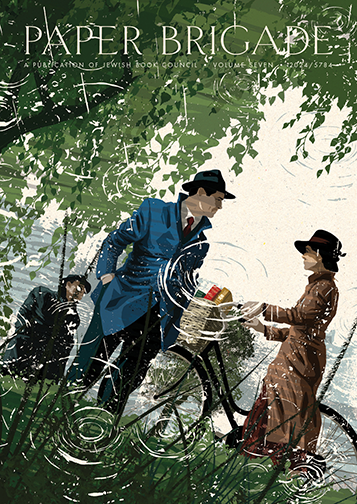
Paper Brigade Volume Seven
Featuring fiction by Scott Nadelson and Adam Schorin; interviews with Rachel Aviv, Jonathan Rosen, Idra Novey, and Sabrina Orah Mark; explorations of the Jewish culinary heritages of Italy, Japan, and Syria; an illustrated look at Uganda’s Jewish community; a Jewish literary map of Los Angeles; and more.
At checkout, you will be given the option to add an electronic gift note to this order.
Note from the Editor
Fusion — the blending of cultures and genres, the coming-together of minds — underlies some of the most innovative developments in literature today. It’s also a bedrock of the design and content of Paper Brigade.
For several contributors to this issue, food writing is a means of exploring how Jewish history has been impacted by different cultures. Cookbook authors Benedetta Jasmine Guetta and Leah Koenig each highlight the evolution of a unique Italian Jewish dish; Jack Hazan explains that his recipes are a tribute to his grandmother’s Syrian traditions as well as his own American childhood.
A piece titled “Fusion” — which includes essays by Ben Nadler and Aaron Israel and Sawako Okochi — traces elements of Ashkenazi food from thirteenth-century Europe to Okochi and Israel’s New York restaurant, Shalom Japan. Like much of what we publish in Paper Brigade, this piece combines genres, a synergy Nadler finds particularly powerful. “As a comics artist, I’m inspired by possibilities of fusing words, colors, lighting, and composition to tell stories,” he reflects. “With nothing but pen and paper, I simultaneously become a director, cinematographer, costume designer, and prop master.” Okochi and Israel highlight yet another kind of fusion: the interweaving of stories that cowriting entails.
Of course, not all narratives are easily reconciled. In an interview, Jonathan Rosen and Rachel Aviv discuss how descriptions and diagnoses of mental illness by patients, doctors, and the media can be harmfully at odds. In “Writing Styles, Thinking Styles,” eight authors share their startlingly different modes of thinking and how these thought patterns impact their work. “Holograms,” a short story by Adam Schorin, addresses the danger of technology erasing the nuances of individual Holocaust survivors’ testimonies. This mirrors widespread concerns about AI overshadowing writers’ creativity in the near future.
While fusion involves blending, it doesn’t preclude individuality. “In the end,” as Okochi and Israel write, “we want each other’s voice to come through and also fuse harmoniously with our own.”
Hunting in America
Tehila Hakimi, translated by Joanna Chen
Sabrina Orah Mark and Idra Novey
Kyra Lisse
David Adjmi and Jack Hazan
Michael Harari
Rachel Aviv and Jonathan Rosen
Stephanie Butnick
Moriel Rothman-Zecher, Dani Shapiro, Allegra Goodman, Francisco Goldman, Emily Bowen Cohen, Chloe Benjamin, Max Gross, and Iddo Gefen
Becca Kantor
Laissez-Passer, 1951
Sarah Sassoon
Abel
Marisa Handler
Noble
Scott Nadelson
Holograms
Adam Schorin
‘Facing the Pacific Sunset’
Adam Kirsch
Jewish Book Council’s Literary Map of Los Angeles
Katherine Messenger
The Very Best Sukkah
Shoshana Nambi
Fusion
Ben Nadler, Sawako Okochi, and Aaron Israel
Water and Flour, Almonds and Sugar
Leah Koenig and Benadetta Jasmine Guetta
To Our Readers
Programs & Publications
Index of Book Reviews
2023 – 2024 Network Authors
JBC Network Communities
2022 National Jewish Book Awards
2022 National Jewish Book Awards Judges
Natan Notable Books